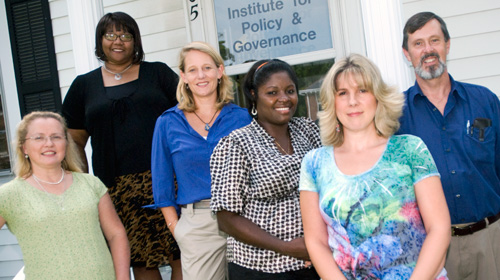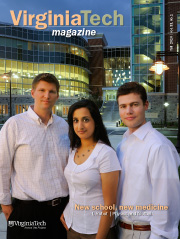 |
|
||||||
|
|
||||||||||||||||||||||||||||||||||||||||||||||||||||||||||||||||||||||||||||||||||||||||||||||
|
JOB NO. 1
by JESSE TUEL
Today, her family is bouncing back. After residing in a women's shelter and then a transitional apartment, the 30-year-old and her children, ages 14, 12, and 7, moved into a house this summer. And Christy, whose last name is withheld for privacy, landed a job earlier this year.
Things are looking up, and the help she's had along the way has been instrumental. Christy was paired with a vocational specialist at the Virginia Tech Institute for Policy and Governance (VT-IPG), which gave her the job readiness training she needed. Vocational specialists at the institute staff the Partnership for Self-Sufficiency (PSS), providing intensive support to clients referred by local Department of Social Services offices in Radford and the counties of Montgomery, Giles, Floyd, and Pulaski. Clients like Christy, eligible for federal Temporary Assistance for Needy Families funding administered through the Virginia Initiative for Employment not Welfare, must become employed to continue receiving the temporary aid. Job No. 1 for the specialists--David Marshall, Karen Mealy, Michelline Stokes, and Teena Vernon, along with program director Mary Beth Dunkenberger--is reducing barriers for employment. A barrier can assume any number of forms: domestic violence, criminal records, substance abuse, physical or mental health issues, food and housing needs, lack of transportation, and more. Even appearance, such as a lack of dental care, can be an employment barrier. A person missing teeth will have difficulty landing a job in food service. "That person automatically has a strike against them," said Dunkenberger. "We're constantly trying to get more resources for dental care." The fact that the vocational specialists are equipped for dismantling all of those barriers testifies to just how far Virginia Tech is willing to go to fulfill its outreach mission. The specialists collectively manage about 100 cases at any one time, responding to the needs of each individual. When the transmission in Christy's car failed, Mealy drove her to pick up applications and drop them off, taking her as far as Roanoke for an interview. So that Christy could drive at night without headaches, the program provided a pair of glasses. Their first interaction was through Mealy's job-readiness class. "She went over success skills, how to interview, how to answer certain questions. She went into how to write a résumé," Christy said. Christy now has a housekeeping job, but Mealy still calls whenever she spots a job opening that might pay better. "She's helped out tremendously," Christy said. "I think it's a really great program. It's just awesome. I know a lot of people have been successful with this program." In many cases, the vocational specialists help clients navigate an intimidating system of services and job opportunities, such as how to get a birth certificate in order to obtain a driver's license, or which employers are willing to hire those with criminal records. "There are a lot of bureaucratic hurdles that the clients are just not equipped to deal with," Dunkenberger said. Added Stokes: "A lot of them are intimidated by the system to begin with, or they don't trust it, or they have misinformation. We help them pinpoint where they need to go." Specialists converse with a new client, trying to draw out the issues that aren't immediately evident. "Sometimes we're able to help the client accept that they need help, and have those conversations with them, and then they're more likely to accept help," Stokes said. Sometimes the progress is one step forward, one step back. Although one client lost her job after a panic attack, the event helped her acknowledge that she needed mental health assistance. Once she stabilizes, she'll still have the job-seeking skills. Another man who served time in jail for drugs was laid off from his job, but he's thrilled to have something on his résumé between incarceration and his next job, the specialists said. "They're just happy to have someone highlight that they have skills and present it in such a way that they can articulate them and own those skills, because they don't really understand the value of all they have to offer," Stokes said. The specialists who give these invaluable gifts are often rewarded in turn. Stokes recently heard back from two clients whose cases were closed but were seeking additional advice. "Having them trust me enough to call me, even though I don't have to work with them anymore, that gives me satisfaction," Stokes said. The institute itself builds strategic relationships between the university and community by linking academic research and outreach efforts to address public policy challenges. PSS blends theory with practice; Dunkenberger calls it a "living laboratory." Studying societal issues from a systemic perspective, VT-IPG's researchers are also informed by results in individual cases and can test interventions in real settings. If lawmakers in Richmond wonder whether domestic violence is a barrier to employment, the vocational specialists are beginning to document the answer, estimating that at least 25 percent of their cases involve domestic violence as an impediment. Regarding mental health, researchers developed screening and referral protocols with New River Valley Community Services. Two years into the collaboration, they're evaluating its efficacy in helping clients achieve self-sufficiency. VT-IPG Director Max Stephenson Jr. said case analysis allows researchers to understand contextual elements more subtly and completely than otherwise possible. "Our PSS program and related research yields insights into actual program impacts that directly inform relevant state and federal officials of the implications of their legislative, budgetary, and regulatory choices for those they aim to serve," Stephenson said. "That knowledge can inform policy decisions and permits the university to serve a profoundly important social function." Like the clients they serve, the specialists get to witness success. Christy, for her part, plans to permanently improve her career potential. On the same August day that her children started school, Christy started a full-time slate of classes that fits into her work schedule. Within about two years, she figures, she can become a nurse. |
|
|||||||||||||||||||||||||||||||||||||||||||||||||||||||||||||||||||||||||||||||||||||||||||||
|
|



